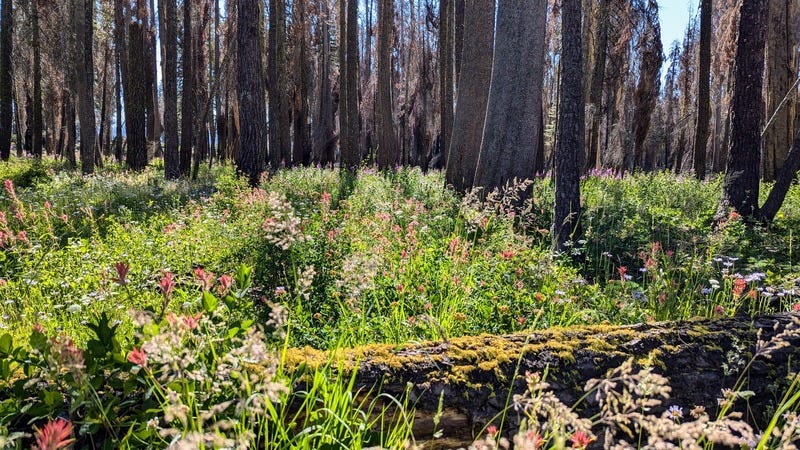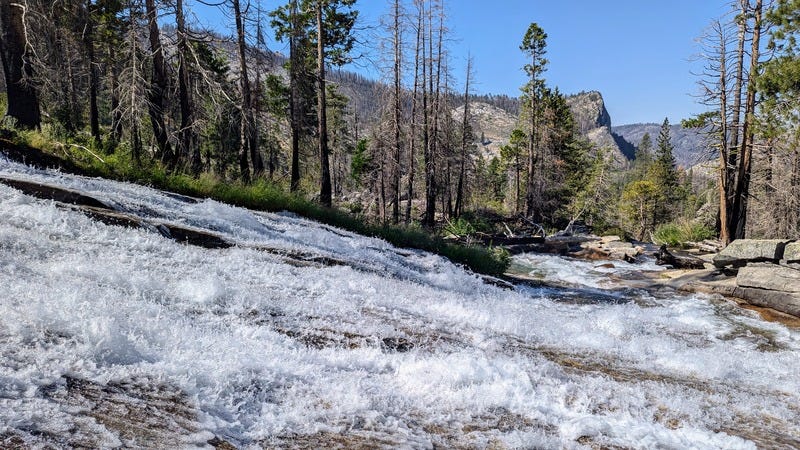A friend told me about Sugar Pines, his favorite kind of pine tree. The pine cones hang off the very tips of the draping branches, like ornaments covered in glistening sap. It sounded like a beautiful tree. He asked me if I’d seen sugar pines before and I said I didn’t think so.
We drove up north, through 108 degree F heat, passed a fire by the side of the road, stopped to get some vegan ice cream and kept driving.
At the higher elevation where we camped, the temperature was down to about 85 degrees. I got out of the van, tired of being contained within that space for hours, and saw a long wooden bench under the shade of pine trees.
I lay down on the wooden slats and took a few deep breaths. I gazed up at the deep blue sky and saw pine cones dangling down from the tips of branches, covered in glistening sap, swaying and shining in the sun and wind.
It must be a sugar pine. I found it!!
The power of a great description is that it’s unmistakable. Although I needed to double check, I knew half a second after looking up into that tree that it must be a sugar pine, because of my friend’s beautiful description of what it must look like.
Maybe I’ve seen sugar pines many times before. I’ve certainly been in that geographical area before.
But without that specific knowledge of what to look for, I might have missed it entirely.
Something people often don’t see about me without a description, is that I’m not a woman. I’m going to say that again—just a description, but somehow perverted into a political statement—I’m not a woman.
The vast majority of people, everywhere I’ve traveled, look at me and assume I’m a woman. Even, interestingly, the people who have heard me talk about being trans or non-binary. At some subconscious level, I am tagged as “female” and people have trouble thinking of me any other way.
I am not blaming them! I’m blaming our gender-binary-dependent society, indoctrinating everyone with these strict, unchangeable social roles.
A lot of people find it uncomfortable when they’re misidentified. This isn’t just a thing for trans people. But trans people often have to deal with being misgendered so much more often that it becomes a real pain point.
It’s not just a slight inconvenience, because all of the things people say can start to stack on top of each other. It can really start to mess with you. You can start to wonder, am I right about who I am? Then that uncertainty feels really bad on top of the assumptions, the insults, the projected insecurity.
If you start to question yourself, what else do you have?
But this isn’t the healthy question of, what gender am I? How do I wish to represent myself to the world? The question is, instead, should I trust what other people say about me even though I know deep inside they are wrong?
The only time I’m almost by default gendered correctly is, sometimes when I’m in a trans support group, people will call me “he,” or “they,” but it doesn’t occur to them to call me “she” because we’re all in a trans group. These people are assuming I’m transmasculine, which is a much more correct and comfortable assumption than people assuming I’m a woman. They’ve learned that there are people like me out there, and they use language to affirm my identity, which I truly appreciate.
Outside of trans spaces, many, many people refer to me as “she” or include me in “women,” “ladies,” “girls,” etc.
I bring this up because I don’t think I’ve talked about this for a while. And it’s something that a lot of people forget. I can’t forget, because unfortunately the language people use for me affects me and causes me stress, even though I try to ignore it.
I’ve sometimes had to let people know that a friend has changed their name, or correct people on what gender someone is. And then sometimes people forget. Months later, I am surprised to have to tell them again. It’s very mysterious, not something I would be likely to forget, myself.
In one sense, I’m glad that maybe people don’t put so much emphasis on the importance of gender. But I think it’s easy to fall into harmfully static stereotypes.
If someone tells you they’re trans or changed their name, or is going by “he” instead of “she,” or if someone tells you this about someone else, it’s now your job to learn and use this new information.
Your internal description of the person now needs to change.
This change may require some practice, by yourself, making notes to yourself, talking to your dog, chatting with a friend on the phone, etc.
It’s not automatic to remember someone’s new name or to change the words you use for them. It takes some practice. Like dance, martial arts, or yoga, practice takes repetition before the new idea settles in and becomes intuitive for your body.
If you’d like something to practice, here’s a suggestion: If you think of me as a woman who talks about being a non-binary person, try and switch that in your mind, to me as a non-binary person who isn’t a woman. This is a subtle difference, but very important.
If you think of me as a person who at least internally is more male than female, that will be a lot closer to the way I see myself.
I encourage you to try this as an exercise, to really try and think of me as a masculine non-binary person. Because if you can do this, if you can see me more accurately, you are joining a tradition of many, many people over the years who have lived outside the gender binary or known and accepted people who have.
Even though you don’t need external validation to be exactly whoever you are, I see you. I will pay close attention to the way you describe yourself, and try to understand who you are, not who I think you should be.
I will look for the sugar pine of who you are, whether or not I see it at first.
Would you like a supportive, queer-friendly community cheering you on as you write this fall? Please fill out this form if you’d like more info on memoir writing classes and our excellent discussion group:
Thanks so much for reading! Let me know what you think in the comments.
Take care,
Rey











100% relate to this and have been feeling so much about it lately. I needed to read this. Thank you for writing and sharing yourself with us. ❤️
Thanks, Rey. I hope one day society can move past the strict binaries it likes to impose. Until then, thank you for the reminder to practice what Terry Pratchett called "second thoughts" - recognising those first thoughts and snap judgements, in order to be more careful and deliberate in action. It's a work in progress, for me.